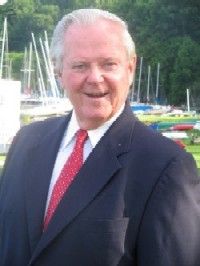
A few hours before the newest members of the Manhasset Lacrosse Hall of Fame were inducted Thursday, Richie Moran sipped brews with a group of his former players at Edison’s Ale House on Plandome Road.
It had been years — for some, even decades — since the legendary lacrosse coach had last seen the men he’d once guided as boys, and all had returned to the hometown connecting them to the game they love.
There was history there at the bar: Moran went 67-5 as head coach of the Indians from 1961-66, winning three consecutive Long Island championships from 1962-64 before a two-year stint at Elmont High School in which his teams went 29-3 and won back-to-back league titles.
That was before Moran went on to become one of the most decorated college lacrosse coaches of all time, coaching Cornell to three national championships in the 1970s and 15 Ivy League titles, including 10 straight from 1974-83.
“Our teams weren’t always the most talented on the field, but there was never any question they were the most prepared,” said Moran, who now resides in the Ithaca area and is president of the Irish national lacrosse program.
“Our guys expected to win, not because of arrogance, but because they knew they were so well prepared there was no way they could lose,” he said. “When they did lose, they took it hard. I didn’t tolerate it. There was no excuse for losing.”
On Thursday, Moran was back where it all began, there to watch as Meghan Clarke, Jason Buttles, Roger Buttles, Michael Ferrari, Gavin Petracca and Patty Anne Kenny Reilly join a Manhasset Hall of Fame that he and several of his players call home.
“One of the biggest mistakes we make in athletics is we don’t let a young person run a drill or speak in a huddle, and that’s where they become leaders,” he said. “All of these players, they’re leaders, whether it’s in lacrosse or in their careers, in their communities. That’s what it means to be a hero and a hall of famer.”
Moran, who played football and lacrosse at Sewanhaka High School from 1951-55, said he credits his coaching philosophy — a combination of hardened disciplinarian and inviting warmth — to his military experience in the United States Marine Corps and the guidance of his parents to always treat others with respect.
For it, he has been inducted into the Manhasset, Long Island and Upstate New York lacrosse halls of fame, as well as the Cornell University Athletic Hall of Fame, the Nassau County Sports Hall of Fame and National Lacrosse Hall of Fame.
“You are going to win and you’re going to lose and that’s the reality of it and you can’t make excuses about losing,” said Bob Rule, a retired Manhasset High School history teacher who played for Moran at Cornell in the 1970s. “Coach Moran was there to say, life isn’t always about you winning, so you have to pick yourself up and move on.”
Moran last year was one of five men profiled in Manhasset native Eric Rieseberg’s memoir, “Heroes Alongside Us: One Man’s Tale of Unlikely Success and the Men Who Made It Possible,” for which Moran wrote the foreword.
In it, Moran lists nine principles he sought to instill in his players to teach them the values of hard work, respect and personal responsibility.
“I didn’t want a young person to back away from an activity because they make a mistake, or kick a guy off a team because he made a mistake, because a lot of the time those are the guys who need the team most, the ones who maybe fall through the cracks,” Moran said. “I always say, you show me a guy who hasn’t made a mistake, and I’ll show you a guy who isn’t trying hard enough.”
The book, Rieseberg said, has circulated throughout lacrosse circles across the country, and was donated in bulk to the U.S. men’s national team and the Manhasset Lacrosse Hall of Fame.
Rieseberg, who played for Moran and was a member of Renzie Lamb’s undefeated 1967 Manhasset team, said the National Lacrosse Hall of Fame is planning to auction off copies of the book to fund various renovations.
Plans are in the works to recognize Moran for their efforts, Rieseberg said.
“This book is not about me and it’s not about Richie, but five guys like him who influenced me and thousands of other people in becoming who they were going to be,” said Rieseberg, of Naples, Fla., who struggled with academic and family issues growing up but went on to a 40-year career in health care administration.
“It’s not easy to be good,” he added. “You look around and you see people who are good at what they do, and it looks easy, but it’s not. It’s hard. What I tried to do is look at people like Richie Moran and take what I learned from him and apply it to life, and identify good when I see it.”






